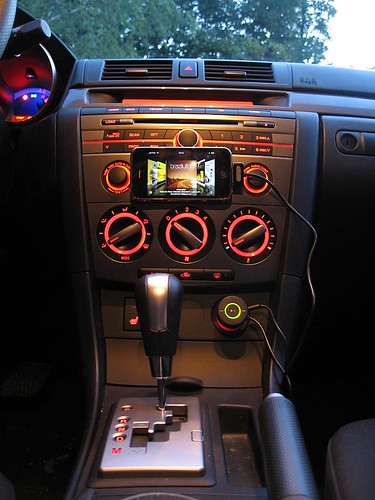Driving While Daydreaming - Friday, January 08, 2010  Austin’s ban on driving while texting went into effect on New Year’s Day. I’m eagerly awaiting the ban on daydreaming while driving, looking at a pretty sunset through the window, and clapping along when “My Best Friend’s Girl” comes on the radio, to ensure that this quest to keep the city streets safe continues along this logical path. Austin’s ban on driving while texting went into effect on New Year’s Day. I’m eagerly awaiting the ban on daydreaming while driving, looking at a pretty sunset through the window, and clapping along when “My Best Friend’s Girl” comes on the radio, to ensure that this quest to keep the city streets safe continues along this logical path.
Okay, yeah – it’s a stupid law. For multiple reasons. We can pick and choose among them, if we like (I’ll see your “lots of things are distracting for drivers” and raise you a “reckless driving is already illegal”), but the thing that sticks in my mind is how unenforceable it is. And when I say “unenforceable”, I don’t mean “unlikely to be enforced” – at $500 a pop, I’m pretty sure that motorists are going to find themselves on the receiving end of APD enforcement efforts. I mean that the actual law, as it’s written, is impossible to enforce without ticketing people for things that are completely legal. Here’s the basic rundown of the law: Using a phone – the devices that are restricted have to be attached to a commercial mobile service – to do anything other than make a call, unless the car is stopped at a red light, is banned. That means that changing the artist who’s playing on your iPhone is illegal. You know what’s not illegal? Changing the artist who’s playing on your iPod Touch, which is a virtually identical piece of hardware that doesn’t connect to a commercial mobile service. One behavior is so dangerous that it needed to be outlawed, while the other is a-okay, and there is literally no difference between them, other than whether the device is connected to AT&T’s network. I’m not totally clear on how the law affects a phone that’s set to “airplane” mode, but I knocked on David’s door to get his take on all of this. “The key word here is ‘overbroad’,” he said. “This is basically a license to pull over anyone for any reason. A police officer could say, ‘Oh, I thought he was texting. I was wrong, but I searched the car and found drugs.’” He explained to me – a non-lawyer who knows not the technical terms – that statutes are found to be unconstitutional for two reasons, most of the time. Either they’re void for vagueness, or they’re overbroad. The initial draft of the bill had problems with vagueness – it made it illegal to look at a text message, but not illegal to look at your phone to check an email (it also accidentally made it illegal to answer a phone call, but not to make one). The revision that went into effect on January 1st added the language “or engage other application software”, which eliminated some of the vagueness (though we’re still unclear on what the exact definition of “dialing” is – I use an iPhone, and I have to open my “phone” app, and then cycle either to “keypad” or “contacts” before I can make a call)… But it’s hard to argue that it’s not overbroad. David asks, when investigating overbroadness: “Can every single police officer enforce the law in the same way?” I think it’s pretty difficult to insist that they can, when it involves a device that fits in the palm of the user’s hand, in many cases looks identical to a device that’s not outlawed by the ordinance, and features certain applications that are legal, and that appear indistinguishable from other, illegal applications. Austin City Councilman Chris Riley, meanwhile, insists that the new language, “is broader but it really is about safety.” I know Chris Riley a little bit – we did an interview when he was a candidate in early 2009 for another outlet to which I contribute – and I don’t doubt that he believes what he says. It’s hard to argue it, even, and the notion that we’re made safer when socially undesirable acts like texting while driving are outlawed, as opposed to merely frowned upon, carries some water. So here’s a solution, courtesy of the techies over at Unicom – it can still be illegal to text while driving, but, they say, limit to to what’s called a secondary offense. This means that peace officers wouldn't be pulling people over for using cell phones. Instead, they'd pull somebody over for swerving or running a stop sign or not watching the road, and then cite them under subsection (B) if they were found to be using a cell phone dangerously. This is consistent with the way the Austin Police Department says they plan to enforce the texting ordinance. That sure seems like the best of both worlds to me. It still puts an increased social pressure on people to put the &$%#ing phone down while driving, which is something we would like to see happen, without giving APD carte blanche to pull over anyone on suspicion of having texted. David, meanwhile, wanted me to mention that, while we’ve agreed as a New Year’s resolution not to take on any more pro bono cases, if you do find yourself cited under the texting ban, depending on your circumstances (hint: not texting while driving while drunk behind the wheel of a stolen F-150), you should give us a call and we’ll see about fighting this together at what would probably be a really affordable rate. Labels: APD, driving while texting, over-criminalization
posted by Dan
permalink
 
|